Nomadic family embrace better life in China's Xinjiang
 0 Comment(s)
0 Comment(s) Print
Print E-mail Xinhua, July 12, 2023
E-mail Xinhua, July 12, 2023
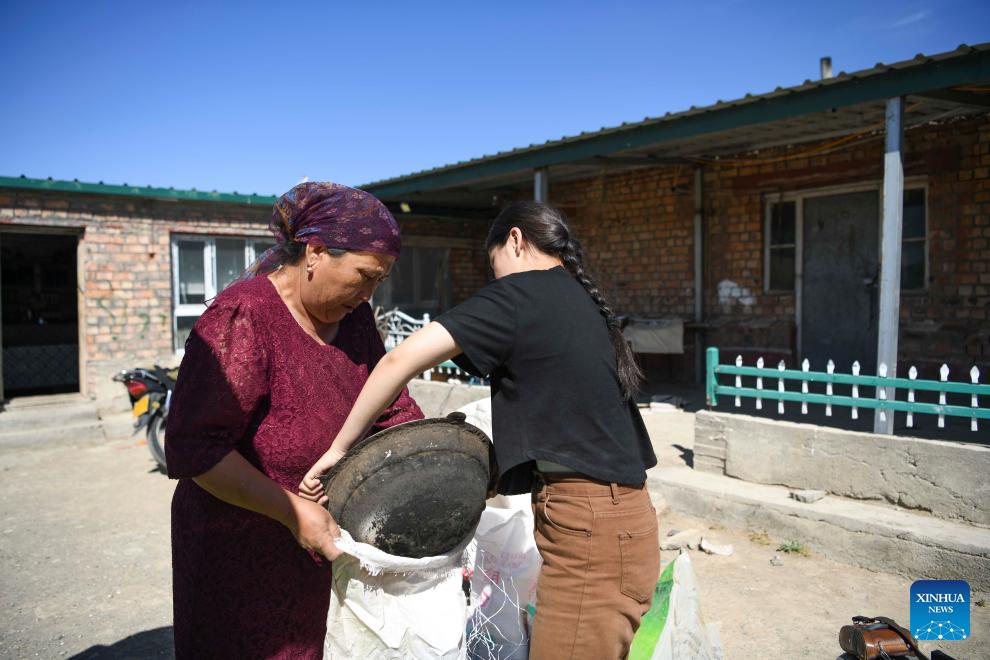
Baht Turlksi and her little daughter Kursunak prepare stuffs for the trip to the summer pastures in Yumin County, northwest China's Xinjiang Uygur Autonomous Region, July 3, 2023. Baht Turlksi, a 53-year-old herder, lives near the majestic Baluke Mountain, which lies in the south of Yumin County, northwest China's Xinjiang Uygur Autonomous Region.
"Baht" means "happiness", this name carries the purest expectation of parents for a better life of the next generation. With the hard working of the family during the decades and the support from the government, the good wishes have already become reality.
Kazak herders move between the winter pastures, spring-autumn pastures and summer pastures throughout the year. For many nomadic families in the autonomous region, the country's modernization drive has brought continuous benefits to their daily lives.
In recent years, the Chinese government has launched projects to build permanent settlements for herders, where medical, educational and cultural services are also available. Like many herders in Xinjiang, life of Baht's family is now semi-settled.
Since several years ago, Baht has stopped accompanying her husband to move to other pastures. Instead, she chooses to stay home to run a shop and take care of her children, who need to go to school.
Recently, the family started this year's trip to the summer pastures, which is considered very important for the goats' growing. For the next two months, Habudelashen Nusupbek, Baht's husband, and other family members will graze more than 400 goats they own in the mountains until the snow falls in September, when they will once again make the transition back their home. (Xinhua/Hu Huhu)
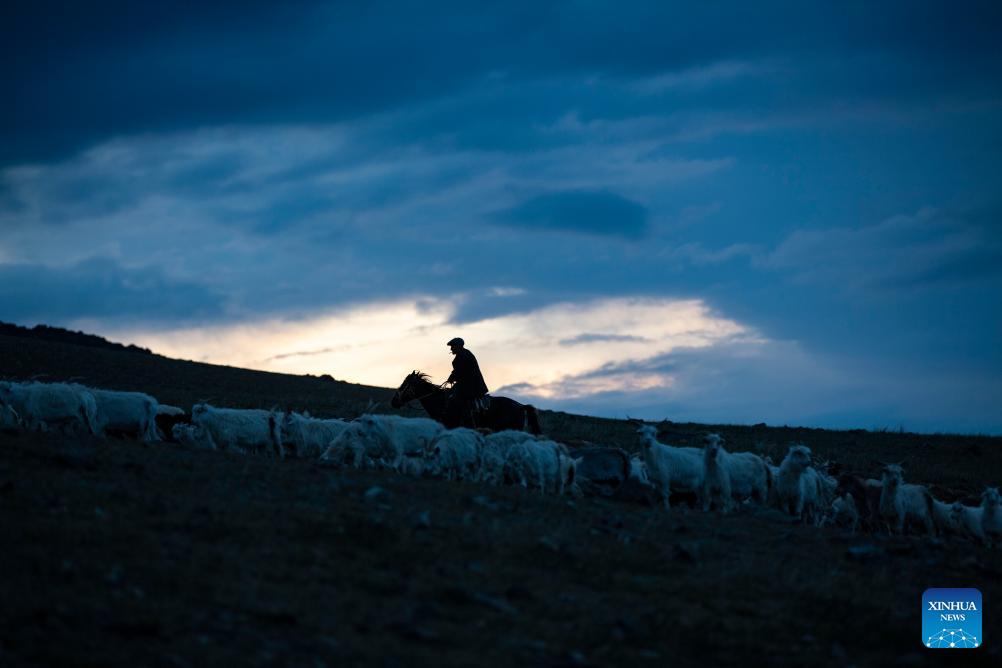
Habudelashen Nusupbek checks the number of the goats in the sunrise in Yumin County, northwest China's Xinjiang Uygur Autonomous Region, July 4, 2023. Baht Turlksi, a 53-year-old herder, lives near the majestic Baluke Mountain, which lies in the south of Yumin County, northwest China's Xinjiang Uygur Autonomous Region.
"Baht" means "happiness", this name carries the purest expectation of parents for a better life of the next generation. With the hard working of the family during the decades and the support from the government, the good wishes have already become reality.
Kazak herders move between the winter pastures, spring-autumn pastures and summer pastures throughout the year. For many nomadic families in the autonomous region, the country's modernization drive has brought continuous benefits to their daily lives.
In recent years, the Chinese government has launched projects to build permanent settlements for herders, where medical, educational and cultural services are also available. Like many herders in Xinjiang, life of Baht's family is now semi-settled.
Since several years ago, Baht has stopped accompanying her husband to move to other pastures. Instead, she chooses to stay home to run a shop and take care of her children, who need to go to school.
Recently, the family started this year's trip to the summer pastures, which is considered very important for the goats' growing. For the next two months, Habudelashen Nusupbek, Baht's husband, and other family members will graze more than 400 goats they own in the mountains until the snow falls in September, when they will once again make the transition back their home. (Xinhua/Hu Huhu)

Habudelashen Nusupbek sets up a tent at the summer pasture in Yumin County, northwest China's Xinjiang Uygur Autonomous Region, July 4, 2023. Baht Turlksi, a 53-year-old herder, lives near the majestic Baluke Mountain, which lies in the south of Yumin County, northwest China's Xinjiang Uygur Autonomous Region.
"Baht" means "happiness", this name carries the purest expectation of parents for a better life of the next generation. With the hard working of the family during the decades and the support from the government, the good wishes have already become reality.
Kazak herders move between the winter pastures, spring-autumn pastures and summer pastures throughout the year. For many nomadic families in the autonomous region, the country's modernization drive has brought continuous benefits to their daily lives.
In recent years, the Chinese government has launched projects to build permanent settlements for herders, where medical, educational and cultural services are also available. Like many herders in Xinjiang, life of Baht's family is now semi-settled.
Since several years ago, Baht has stopped accompanying her husband to move to other pastures. Instead, she chooses to stay home to run a shop and take care of her children, who need to go to school.
Recently, the family started this year's trip to the summer pastures, which is considered very important for the goats' growing. For the next two months, Habudelashen Nusupbek, Baht's husband, and other family members will graze more than 400 goats they own in the mountains until the snow falls in September, when they will once again make the transition back their home. (Xinhua/Hu Huhu)
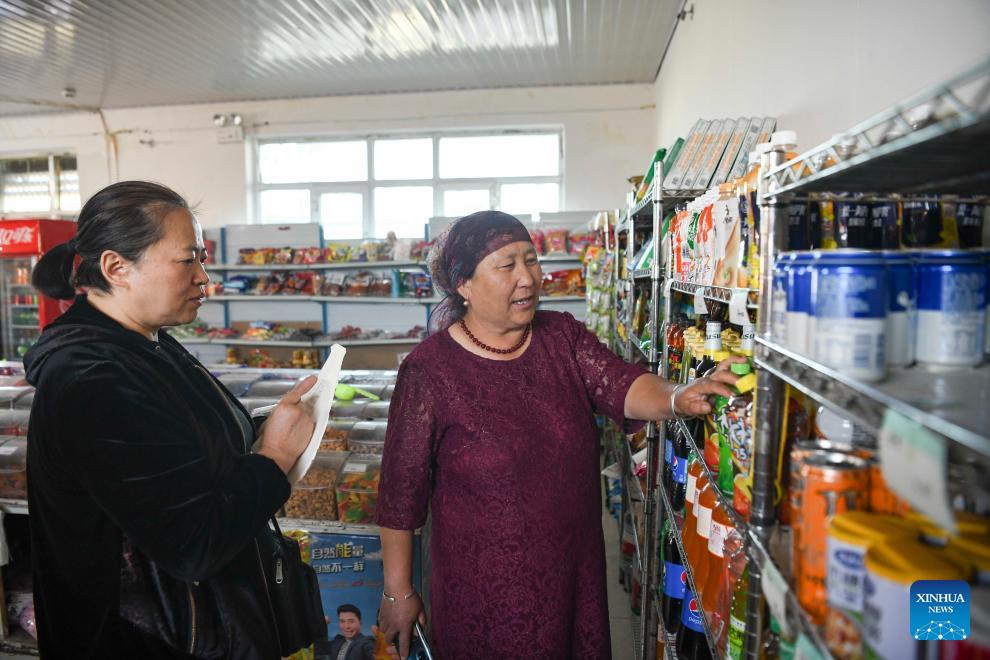
Baht Turlksi(R) buys necessities for her husband's trip and goods for her shop at a shop in Yumin County, northwest China's Xinjiang Uygur Autonomous Region, July 2, 2023. Baht Turlksi, a 53-year-old herder, lives near the majestic Baluke Mountain, which lies in the south of Yumin County, northwest China's Xinjiang Uygur Autonomous Region.
"Baht" means "happiness", this name carries the purest expectation of parents for a better life of the next generation. With the hard working of the family during the decades and the support from the government, the good wishes have already become reality.
Kazak herders move between the winter pastures, spring-autumn pastures and summer pastures throughout the year. For many nomadic families in the autonomous region, the country's modernization drive has brought continuous benefits to their daily lives.
In recent years, the Chinese government has launched projects to build permanent settlements for herders, where medical, educational and cultural services are also available. Like many herders in Xinjiang, life of Baht's family is now semi-settled.
Since several years ago, Baht has stopped accompanying her husband to move to other pastures. Instead, she chooses to stay home to run a shop and take care of her children, who need to go to school.
Recently, the family started this year's trip to the summer pastures, which is considered very important for the goats' growing. For the next two months, Habudelashen Nusupbek, Baht's husband, and other family members will graze more than 400 goats they own in the mountains until the snow falls in September, when they will once again make the transition back their home. (Xinhua/Hu Huhu)

Habudelashen Nusupbek (3rd, L) and other family members have a meal after arriving at the campsite of the first day's trip to the summer pastures in Yumin County, northwest China's Xinjiang Uygur Autonomous Region, July 3, 2023. Baht Turlksi, a 53-year-old herder, lives near the majestic Baluke Mountain, which lies in the south of Yumin County, northwest China's Xinjiang Uygur Autonomous Region.
"Baht" means "happiness", this name carries the purest expectation of parents for a better life of the next generation. With the hard working of the family during the decades and the support from the government, the good wishes have already become reality.
Kazak herders move between the winter pastures, spring-autumn pastures and summer pastures throughout the year. For many nomadic families in the autonomous region, the country's modernization drive has brought continuous benefits to their daily lives.
In recent years, the Chinese government has launched projects to build permanent settlements for herders, where medical, educational and cultural services are also available. Like many herders in Xinjiang, life of Baht's family is now semi-settled.
Since several years ago, Baht has stopped accompanying her husband to move to other pastures. Instead, she chooses to stay home to run a shop and take care of her children, who need to go to school.
Recently, the family started this year's trip to the summer pastures, which is considered very important for the goats' growing. For the next two months, Habudelashen Nusupbek, Baht's husband, and other family members will graze more than 400 goats they own in the mountains until the snow falls in September, when they will once again make the transition back their home. (Xinhua/Hu Huhu)
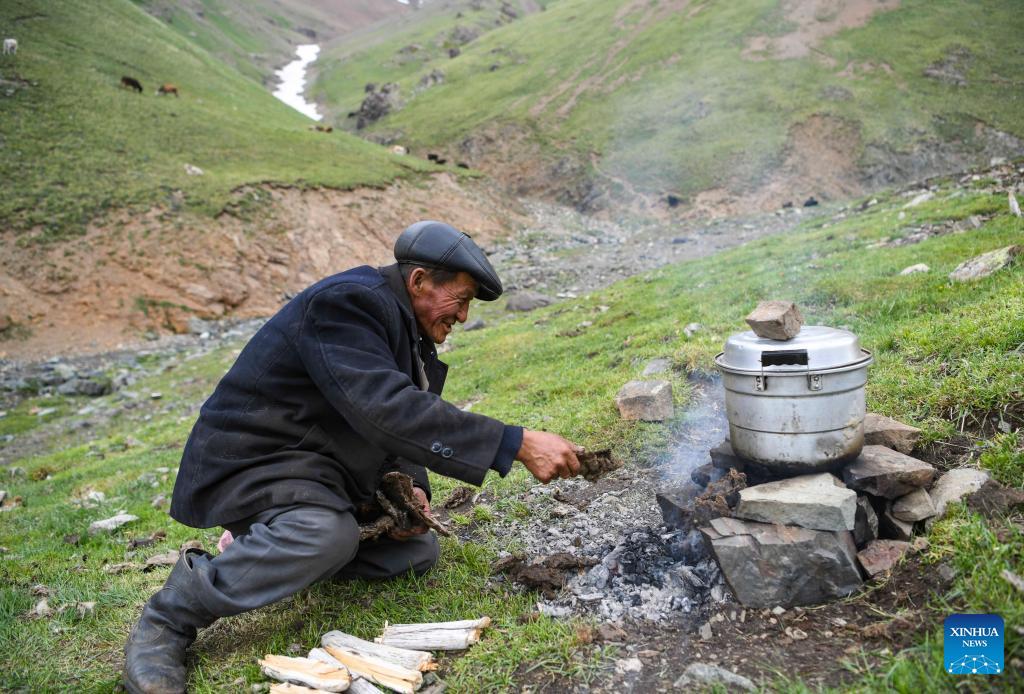
Habudelashen Nusupbek boils tea at the summer pasture in Yumin County, northwest China's Xinjiang Uygur Autonomous Region, July 4, 2023. Baht Turlksi, a 53-year-old herder, lives near the majestic Baluke Mountain, which lies in the south of Yumin County, northwest China's Xinjiang Uygur Autonomous Region.
"Baht" means "happiness", this name carries the purest expectation of parents for a better life of the next generation. With the hard working of the family during the decades and the support from the government, the good wishes have already become reality.
Kazak herders move between the winter pastures, spring-autumn pastures and summer pastures throughout the year. For many nomadic families in the autonomous region, the country's modernization drive has brought continuous benefits to their daily lives.
In recent years, the Chinese government has launched projects to build permanent settlements for herders, where medical, educational and cultural services are also available. Like many herders in Xinjiang, life of Baht's family is now semi-settled.
Since several years ago, Baht has stopped accompanying her husband to move to other pastures. Instead, she chooses to stay home to run a shop and take care of her children, who need to go to school.
Recently, the family started this year's trip to the summer pastures, which is considered very important for the goats' growing. For the next two months, Habudelashen Nusupbek, Baht's husband, and other family members will graze more than 400 goats they own in the mountains until the snow falls in September, when they will once again make the transition back their home. (Xinhua/Hu Huhu)
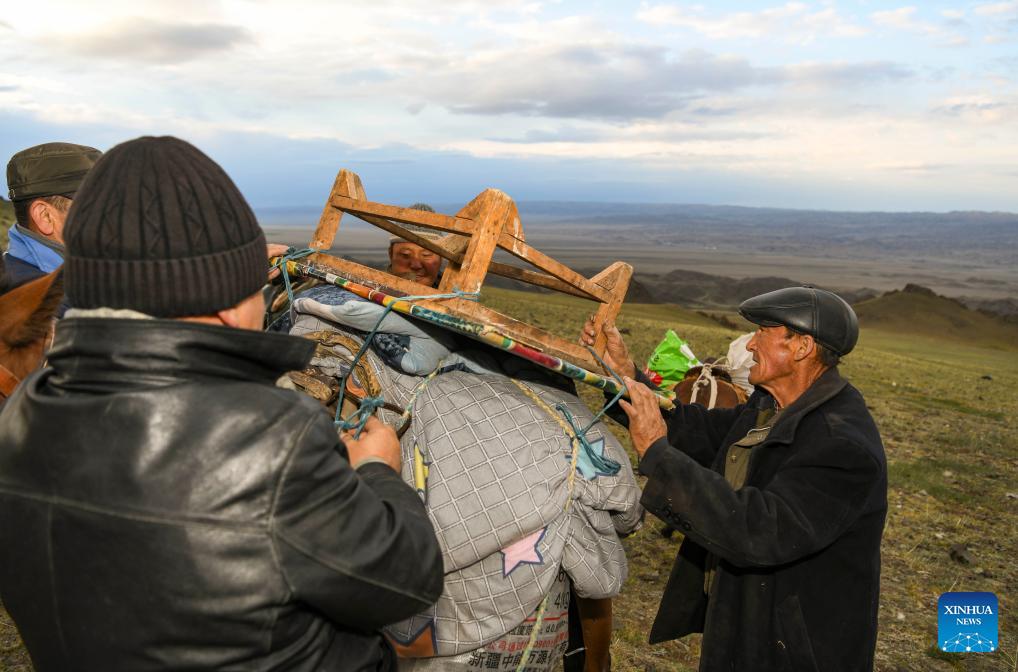
Habudelashen Nusupbek (R) and other family members tie stuffs to a horse and prepare to start their second day's trip to the summer pastures in Yumin County, northwest China's Xinjiang Uygur Autonomous Region, July 4, 2023. Baht Turlksi, a 53-year-old herder, lives near the majestic Baluke Mountain, which lies in the south of Yumin County, northwest China's Xinjiang Uygur Autonomous Region.
"Baht" means "happiness", this name carries the purest expectation of parents for a better life of the next generation. With the hard working of the family during the decades and the support from the government, the good wishes have already become reality.
Kazak herders move between the winter pastures, spring-autumn pastures and summer pastures throughout the year. For many nomadic families in the autonomous region, the country's modernization drive has brought continuous benefits to their daily lives.
In recent years, the Chinese government has launched projects to build permanent settlements for herders, where medical, educational and cultural services are also available. Like many herders in Xinjiang, life of Baht's family is now semi-settled.
Since several years ago, Baht has stopped accompanying her husband to move to other pastures. Instead, she chooses to stay home to run a shop and take care of her children, who need to go to school.
Recently, the family started this year's trip to the summer pastures, which is considered very important for the goats' growing. For the next two months, Habudelashen Nusupbek, Baht's husband, and other family members will graze more than 400 goats they own in the mountains until the snow falls in September, when they will once again make the transition back their home. (Xinhua/Hu Huhu)
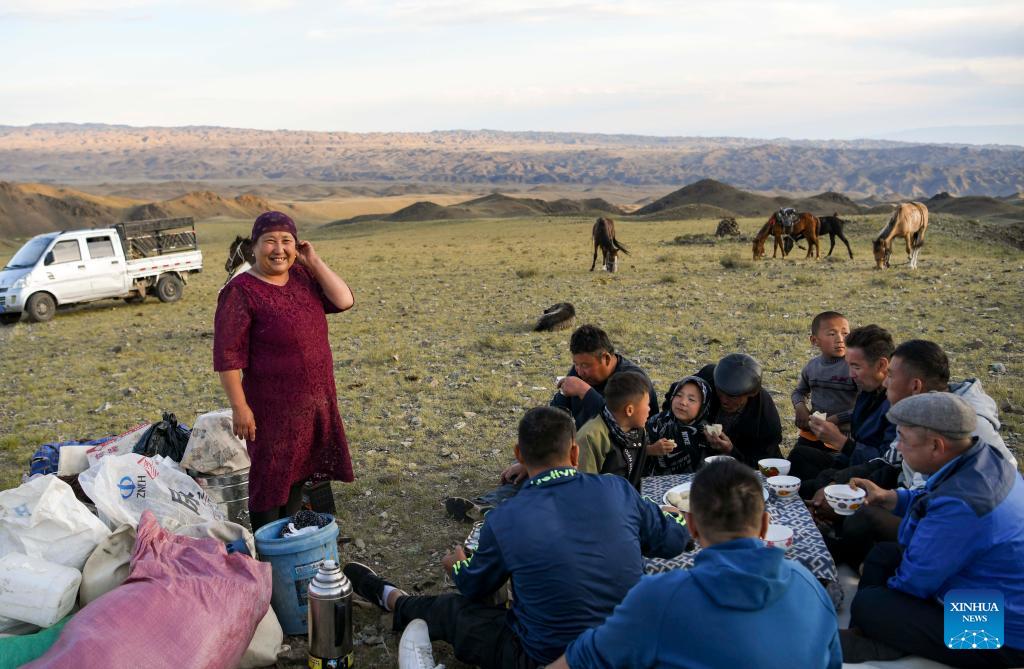
Baht Turlksi (L) brings dinner and other stuffs to the campsite of the first day's trip to the summer pastures in Yumin County, northwest China's Xinjiang Uygur Autonomous Region, July 3, 2023. Baht Turlksi, a 53-year-old herder, lives near the majestic Baluke Mountain, which lies in the south of Yumin County, northwest China's Xinjiang Uygur Autonomous Region.
"Baht" means "happiness", this name carries the purest expectation of parents for a better life of the next generation. With the hard working of the family during the decades and the support from the government, the good wishes have already become reality.
Kazak herders move between the winter pastures, spring-autumn pastures and summer pastures throughout the year. For many nomadic families in the autonomous region, the country's modernization drive has brought continuous benefits to their daily lives.
In recent years, the Chinese government has launched projects to build permanent settlements for herders, where medical, educational and cultural services are also available. Like many herders in Xinjiang, life of Baht's family is now semi-settled.
Since several years ago, Baht has stopped accompanying her husband to move to other pastures. Instead, she chooses to stay home to run a shop and take care of her children, who need to go to school.
Recently, the family started this year's trip to the summer pastures, which is considered very important for the goats' growing. For the next two months, Habudelashen Nusupbek, Baht's husband, and other family members will graze more than 400 goats they own in the mountains until the snow falls in September, when they will once again make the transition back their home. (Xinhua/Hu Huhu)
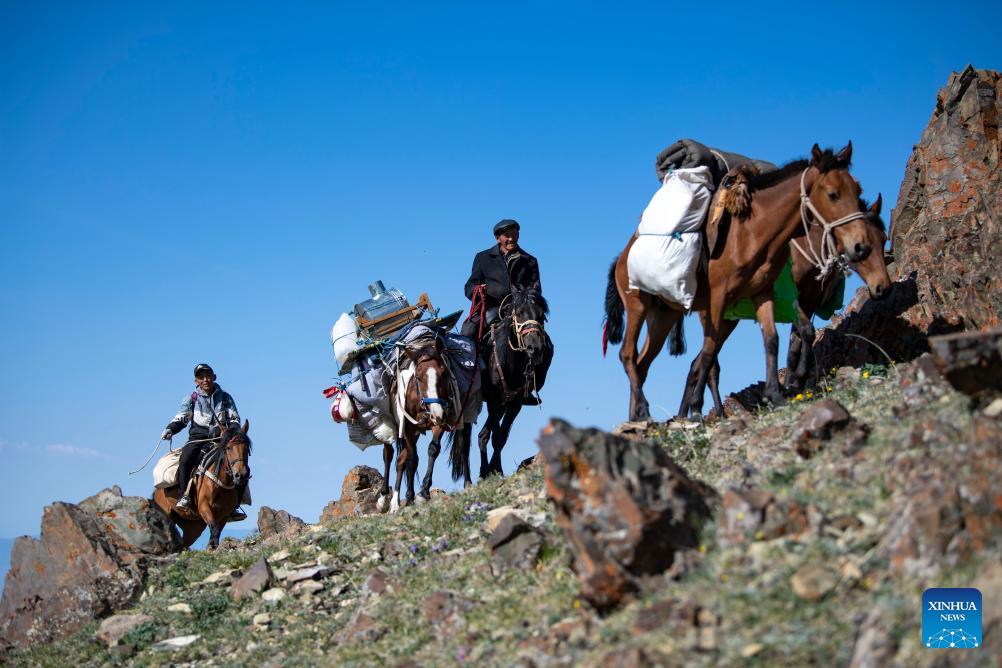
Habudelashen Nusupbek (front) and his son-in-law ride on a steep path in Yumin County, northwest China's Xinjiang Uygur Autonomous Region, July 4, 2023. Baht Turlksi, a 53-year-old herder, lives near the majestic Baluke Mountain, which lies in the south of Yumin County, northwest China's Xinjiang Uygur Autonomous Region.
"Baht" means "happiness", this name carries the purest expectation of parents for a better life of the next generation. With the hard working of the family during the decades and the support from the government, the good wishes have already become reality.
Kazak herders move between the winter pastures, spring-autumn pastures and summer pastures throughout the year. For many nomadic families in the autonomous region, the country's modernization drive has brought continuous benefits to their daily lives.
In recent years, the Chinese government has launched projects to build permanent settlements for herders, where medical, educational and cultural services are also available. Like many herders in Xinjiang, life of Baht's family is now semi-settled.
Since several years ago, Baht has stopped accompanying her husband to move to other pastures. Instead, she chooses to stay home to run a shop and take care of her children, who need to go to school.
Recently, the family started this year's trip to the summer pastures, which is considered very important for the goats' growing. For the next two months, Habudelashen Nusupbek, Baht's husband, and other family members will graze more than 400 goats they own in the mountains until the snow falls in September, when they will once again make the transition back their home. (Xinhua/Hu Huhu)
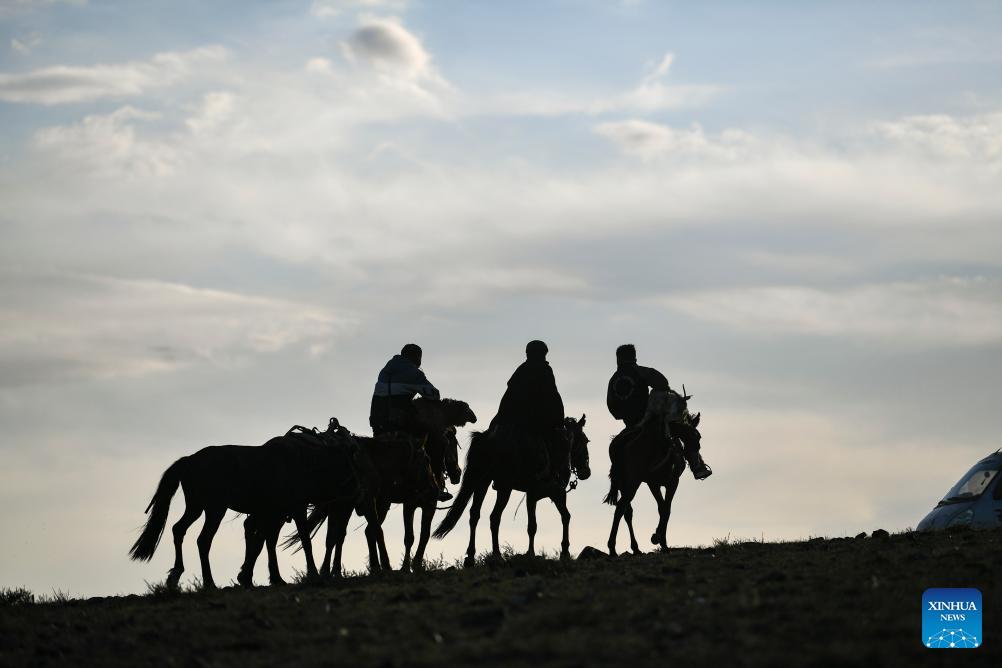
Habudelashen Nusupbek (C) and other family members move to the summer pastures in Yumin County, northwest China's Xinjiang Uygur Autonomous Region, July 3, 2023. Baht Turlksi, a 53-year-old herder, lives near the majestic Baluke Mountain, which lies in the south of Yumin County, northwest China's Xinjiang Uygur Autonomous Region.
"Baht" means "happiness", this name carries the purest expectation of parents for a better life of the next generation. With the hard working of the family during the decades and the support from the government, the good wishes have already become reality.
Kazak herders move between the winter pastures, spring-autumn pastures and summer pastures throughout the year. For many nomadic families in the autonomous region, the country's modernization drive has brought continuous benefits to their daily lives.
In recent years, the Chinese government has launched projects to build permanent settlements for herders, where medical, educational and cultural services are also available. Like many herders in Xinjiang, life of Baht's family is now semi-settled.
Since several years ago, Baht has stopped accompanying her husband to move to other pastures. Instead, she chooses to stay home to run a shop and take care of her children, who need to go to school.
Recently, the family started this year's trip to the summer pastures, which is considered very important for the goats' growing. For the next two months, Habudelashen Nusupbek, Baht's husband, and other family members will graze more than 400 goats they own in the mountains until the snow falls in September, when they will once again make the transition back their home. (Xinhua/Hu Huhu)
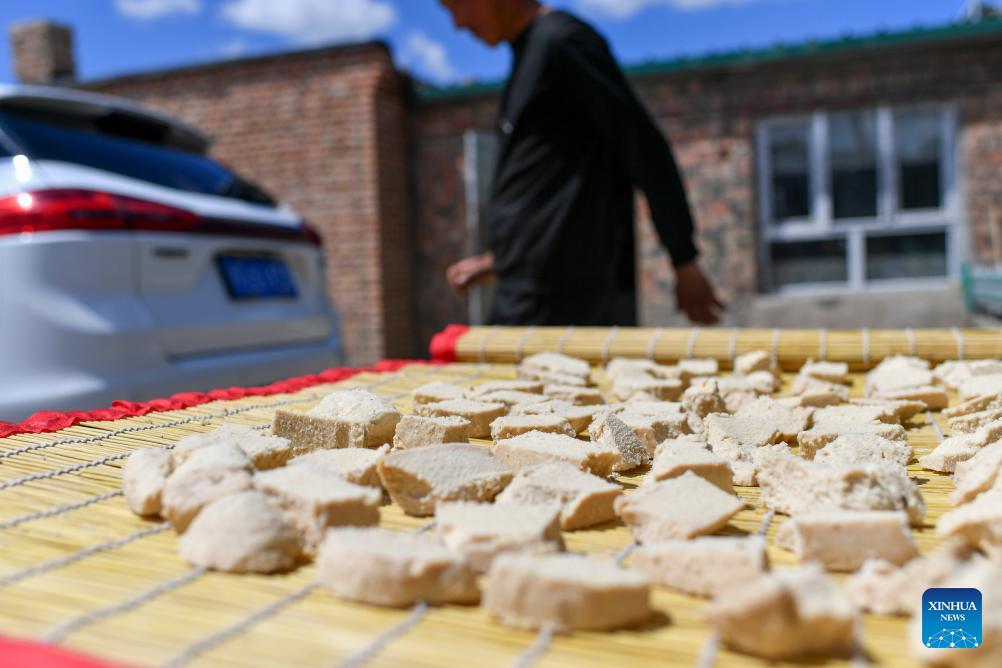
This photo taken on July 6, 2023 shows yogurt chunks made by Baht Turlksi to sell in Yumin County, northwest China's Xinjiang Uygur Autonomous Region. Baht Turlksi, a 53-year-old herder, lives near the majestic Baluke Mountain, which lies in the south of Yumin County, northwest China's Xinjiang Uygur Autonomous Region.
"Baht" means "happiness", this name carries the purest expectation of parents for a better life of the next generation. With the hard working of the family during the decades and the support from the government, the good wishes have already become reality.
Kazak herders move between the winter pastures, spring-autumn pastures and summer pastures throughout the year. For many nomadic families in the autonomous region, the country's modernization drive has brought continuous benefits to their daily lives.
In recent years, the Chinese government has launched projects to build permanent settlements for herders, where medical, educational and cultural services are also available. Like many herders in Xinjiang, life of Baht's family is now semi-settled.
Since several years ago, Baht has stopped accompanying her husband to move to other pastures. Instead, she chooses to stay home to run a shop and take care of her children, who need to go to school.
Recently, the family started this year's trip to the summer pastures, which is considered very important for the goats' growing. For the next two months, Habudelashen Nusupbek, Baht's husband, and other family members will graze more than 400 goats they own in the mountains until the snow falls in September, when they will once again make the transition back their home. (Xinhua/Hu Huhu)
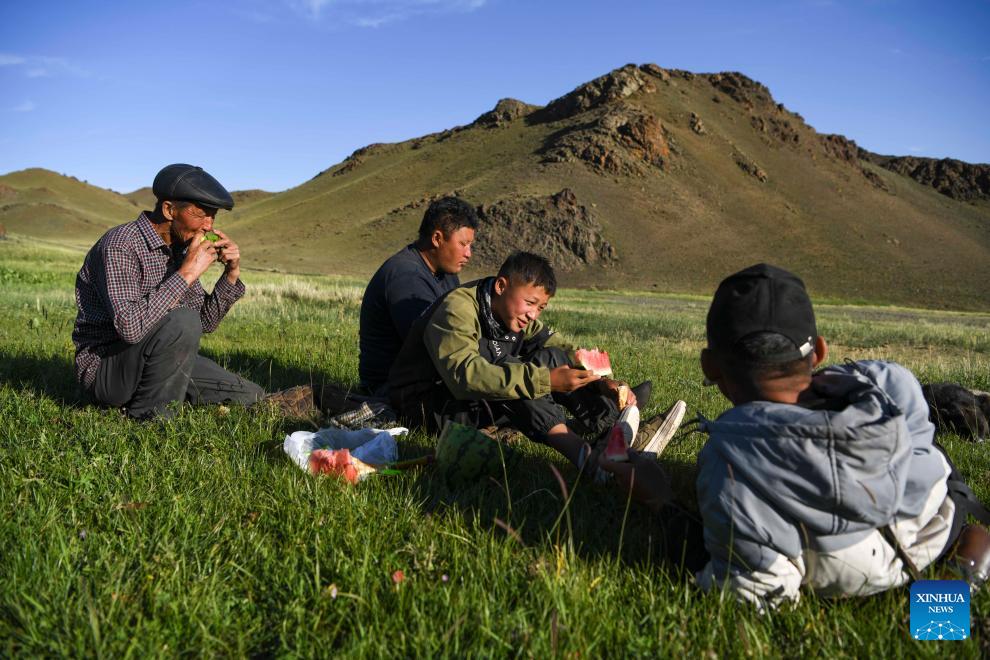
Habudelashen Nusupbek (1st, L) and other family members take a rest during their trip to the summer pastures in Yumin County, northwest China's Xinjiang Uygur Autonomous Region, July 3, 2023. Baht Turlksi, a 53-year-old herder, lives near the majestic Baluke Mountain, which lies in the south of Yumin County, northwest China's Xinjiang Uygur Autonomous Region.
"Baht" means "happiness", this name carries the purest expectation of parents for a better life of the next generation. With the hard working of the family during the decades and the support from the government, the good wishes have already become reality.
Kazak herders move between the winter pastures, spring-autumn pastures and summer pastures throughout the year. For many nomadic families in the autonomous region, the country's modernization drive has brought continuous benefits to their daily lives.
In recent years, the Chinese government has launched projects to build permanent settlements for herders, where medical, educational and cultural services are also available. Like many herders in Xinjiang, life of Baht's family is now semi-settled.
Since several years ago, Baht has stopped accompanying her husband to move to other pastures. Instead, she chooses to stay home to run a shop and take care of her children, who need to go to school.
Recently, the family started this year's trip to the summer pastures, which is considered very important for the goats' growing. For the next two months, Habudelashen Nusupbek, Baht's husband, and other family members will graze more than 400 goats they own in the mountains until the snow falls in September, when they will once again make the transition back their home. (Xinhua/Hu Huhu)

Baht Turlksi and her little daughter Kursunak prepare stuffs for the trip to the summer pastures in Yumin County, northwest China's Xinjiang Uygur Autonomous Region, July 3, 2023. On the first day of the trip, the road is relatively flat, and materials could be transported to the foot of the mountain by car. Baht Turlksi, a 53-year-old herder, lives near the majestic Baluke Mountain, which lies in the south of Yumin County, northwest China's Xinjiang Uygur Autonomous Region.
"Baht" means "happiness", this name carries the purest expectation of parents for a better life of the next generation. With the hard working of the family during the decades and the support from the government, the good wishes have already become reality.
Kazak herders move between the winter pastures, spring-autumn pastures and summer pastures throughout the year. For many nomadic families in the autonomous region, the country's modernization drive has brought continuous benefits to their daily lives.
In recent years, the Chinese government has launched projects to build permanent settlements for herders, where medical, educational and cultural services are also available. Like many herders in Xinjiang, life of Baht's family is now semi-settled.
Since several years ago, Baht has stopped accompanying her husband to move to other pastures. Instead, she chooses to stay home to run a shop and take care of her children, who need to go to school.
Recently, the family started this year's trip to the summer pastures, which is considered very important for the goats' growing. For the next two months, Habudelashen Nusupbek, Baht's husband, and other family members will graze more than 400 goats they own in the mountains until the snow falls in September, when they will once again make the transition back their home. (Xinhua/Hu Huhu)
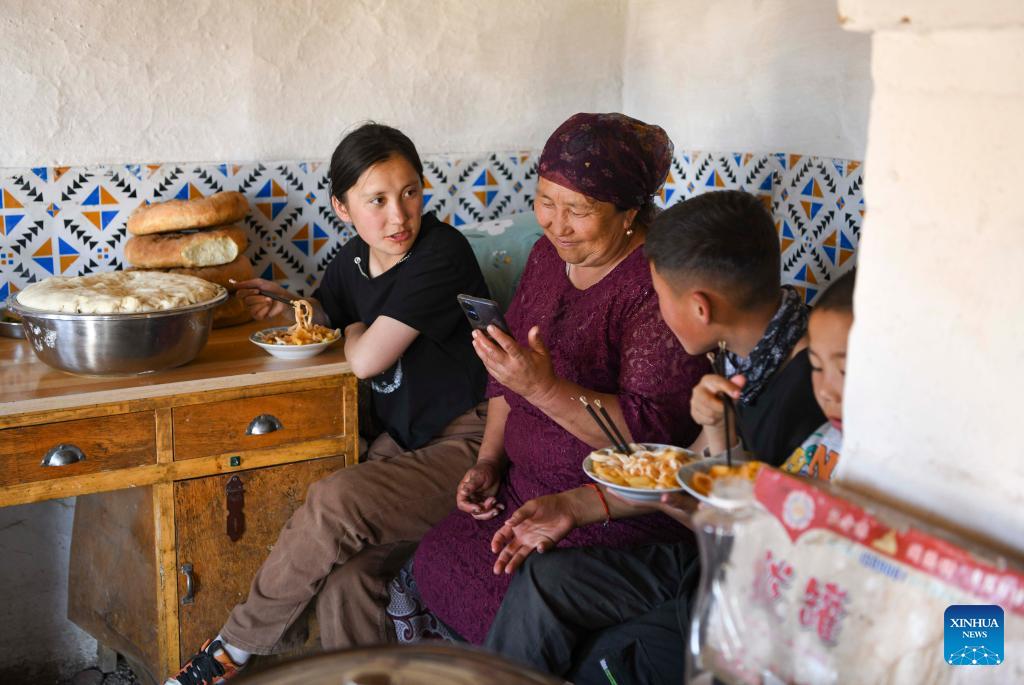
Baht Turlksi (2nd, L) chats with her little daughter Kursunak (1st, L) and nephew Zhaisang (3rd, L) at their home in Yumin County, northwest China's Xinjiang Uygur Autonomous Region, July 3, 2023. Baht Turlksi, a 53-year-old herder, lives near the majestic Baluke Mountain, which lies in the south of Yumin County, northwest China's Xinjiang Uygur Autonomous Region.
"Baht" means "happiness", this name carries the purest expectation of parents for a better life of the next generation. With the hard working of the family during the decades and the support from the government, the good wishes have already become reality.
Kazak herders move between the winter pastures, spring-autumn pastures and summer pastures throughout the year. For many nomadic families in the autonomous region, the country's modernization drive has brought continuous benefits to their daily lives.
In recent years, the Chinese government has launched projects to build permanent settlements for herders, where medical, educational and cultural services are also available. Like many herders in Xinjiang, life of Baht's family is now semi-settled.
Since several years ago, Baht has stopped accompanying her husband to move to other pastures. Instead, she chooses to stay home to run a shop and take care of her children, who need to go to school.
Recently, the family started this year's trip to the summer pastures, which is considered very important for the goats' growing. For the next two months, Habudelashen Nusupbek, Baht's husband, and other family members will graze more than 400 goats they own in the mountains until the snow falls in September, when they will once again make the transition back their home. (Xinhua/Hu Huhu)
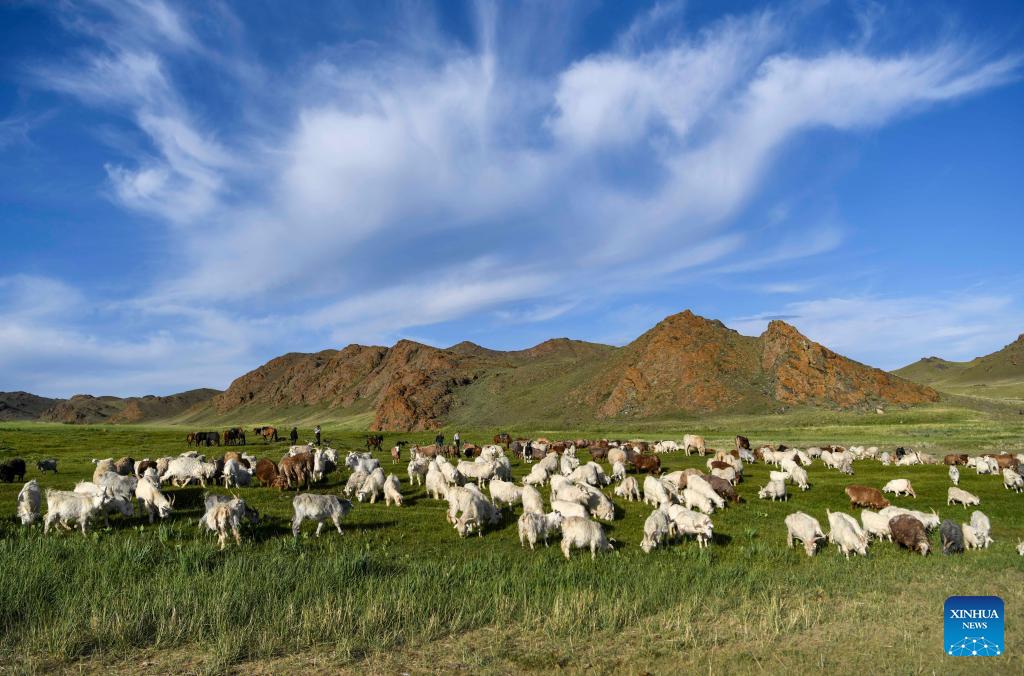
Goats graze during the trip to the summer pastures in Yumin County, northwest China's Xinjiang Uygur Autonomous Region, July 3, 2023. Baht Turlksi, a 53-year-old herder, lives near the majestic Baluke Mountain, which lies in the south of Yumin County, northwest China's Xinjiang Uygur Autonomous Region.
"Baht" means "happiness", this name carries the purest expectation of parents for a better life of the next generation. With the hard working of the family during the decades and the support from the government, the good wishes have already become reality.
Kazak herders move between the winter pastures, spring-autumn pastures and summer pastures throughout the year. For many nomadic families in the autonomous region, the country's modernization drive has brought continuous benefits to their daily lives.
In recent years, the Chinese government has launched projects to build permanent settlements for herders, where medical, educational and cultural services are also available. Like many herders in Xinjiang, life of Baht's family is now semi-settled.
Since several years ago, Baht has stopped accompanying her husband to move to other pastures. Instead, she chooses to stay home to run a shop and take care of her children, who need to go to school.
Recently, the family started this year's trip to the summer pastures, which is considered very important for the goats' growing. For the next two months, Habudelashen Nusupbek, Baht's husband, and other family members will graze more than 400 goats they own in the mountains until the snow falls in September, when they will once again make the transition back their home. (Xinhua/Hu Huhu)
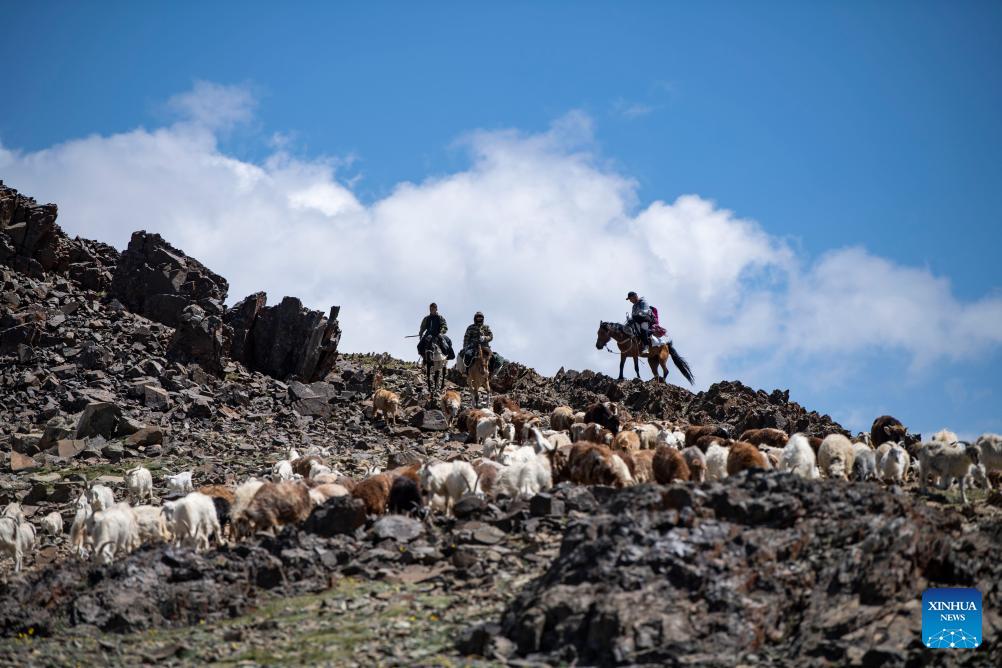
Herders move to the summer pastures in Yumin County, northwest China's Xinjiang Uygur Autonomous Region, July 4, 2023. Baht Turlksi, a 53-year-old herder, lives near the majestic Baluke Mountain, which lies in the south of Yumin County, northwest China's Xinjiang Uygur Autonomous Region.
"Baht" means "happiness", this name carries the purest expectation of parents for a better life of the next generation. With the hard working of the family during the decades and the support from the government, the good wishes have already become reality.
Kazak herders move between the winter pastures, spring-autumn pastures and summer pastures throughout the year. For many nomadic families in the autonomous region, the country's modernization drive has brought continuous benefits to their daily lives.
In recent years, the Chinese government has launched projects to build permanent settlements for herders, where medical, educational and cultural services are also available. Like many herders in Xinjiang, life of Baht's family is now semi-settled.
Since several years ago, Baht has stopped accompanying her husband to move to other pastures. Instead, she chooses to stay home to run a shop and take care of her children, who need to go to school.
Recently, the family started this year's trip to the summer pastures, which is considered very important for the goats' growing. For the next two months, Habudelashen Nusupbek, Baht's husband, and other family members will graze more than 400 goats they own in the mountains until the snow falls in September, when they will once again make the transition back their home. (Xinhua/Hu Huhu)

Habudelashen Nusupbek drives goats to the summer pastures in Yumin County, northwest China's Xinjiang Uygur Autonomous Region, July 3, 2023. Baht Turlksi, a 53-year-old herder, lives near the majestic Baluke Mountain, which lies in the south of Yumin County, northwest China's Xinjiang Uygur Autonomous Region.
"Baht" means "happiness", this name carries the purest expectation of parents for a better life of the next generation. With the hard working of the family during the decades and the support from the government, the good wishes have already become reality.
Kazak herders move between the winter pastures, spring-autumn pastures and summer pastures throughout the year. For many nomadic families in the autonomous region, the country's modernization drive has brought continuous benefits to their daily lives.
In recent years, the Chinese government has launched projects to build permanent settlements for herders, where medical, educational and cultural services are also available. Like many herders in Xinjiang, life of Baht's family is now semi-settled.
Since several years ago, Baht has stopped accompanying her husband to move to other pastures. Instead, she chooses to stay home to run a shop and take care of her children, who need to go to school.
Recently, the family started this year's trip to the summer pastures, which is considered very important for the goats' growing. For the next two months, Habudelashen Nusupbek, Baht's husband, and other family members will graze more than 400 goats they own in the mountains until the snow falls in September, when they will once again make the transition back their home. (Xinhua/Hu Huhu)
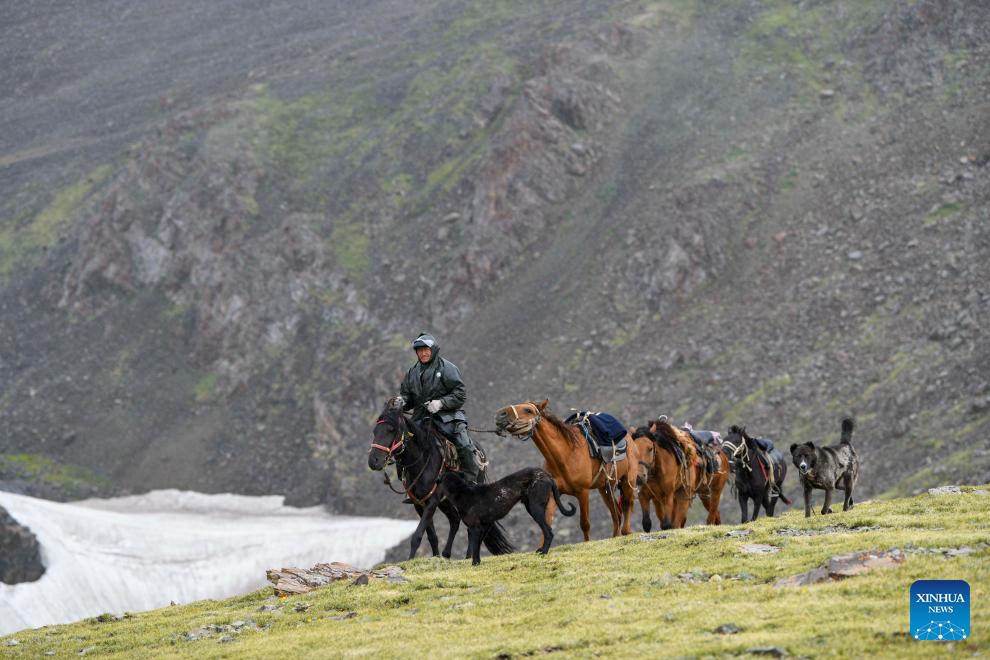
Habudelashen Nusupbek is seen at the summer pasture in Yumin County, northwest China's Xinjiang Uygur Autonomous Region, July 5, 2023. Baht Turlksi, a 53-year-old herder, lives near the majestic Baluke Mountain, which lies in the south of Yumin County, northwest China's Xinjiang Uygur Autonomous Region.
"Baht" means "happiness", this name carries the purest expectation of parents for a better life of the next generation. With the hard working of the family during the decades and the support from the government, the good wishes have already become reality.
Kazak herders move between the winter pastures, spring-autumn pastures and summer pastures throughout the year. For many nomadic families in the autonomous region, the country's modernization drive has brought continuous benefits to their daily lives.
In recent years, the Chinese government has launched projects to build permanent settlements for herders, where medical, educational and cultural services are also available. Like many herders in Xinjiang, life of Baht's family is now semi-settled.
Since several years ago, Baht has stopped accompanying her husband to move to other pastures. Instead, she chooses to stay home to run a shop and take care of her children, who need to go to school.
Recently, the family started this year's trip to the summer pastures, which is considered very important for the goats' growing. For the next two months, Habudelashen Nusupbek, Baht's husband, and other family members will graze more than 400 goats they own in the mountains until the snow falls in September, when they will once again make the transition back their home. (Xinhua/Hu Huhu)

Baht Turlksi packs goods for a customer at her shop in Yumin County, northwest China's Xinjiang Uygur Autonomous Region, July 2, 2023. Apart from herding cattle for a living, the Baht's family has diversified their income sources. Baht Turlksi, a 53-year-old herder, lives near the majestic Baluke Mountain, which lies in the south of Yumin County, northwest China's Xinjiang Uygur Autonomous Region.
"Baht" means "happiness", this name carries the purest expectation of parents for a better life of the next generation. With the hard working of the family during the decades and the support from the government, the good wishes have already become reality.
Kazak herders move between the winter pastures, spring-autumn pastures and summer pastures throughout the year. For many nomadic families in the autonomous region, the country's modernization drive has brought continuous benefits to their daily lives.
In recent years, the Chinese government has launched projects to build permanent settlements for herders, where medical, educational and cultural services are also available. Like many herders in Xinjiang, life of Baht's family is now semi-settled.
Since several years ago, Baht has stopped accompanying her husband to move to other pastures. Instead, she chooses to stay home to run a shop and take care of her children, who need to go to school.
Recently, the family started this year's trip to the summer pastures, which is considered very important for the goats' growing. For the next two months, Habudelashen Nusupbek, Baht's husband, and other family members will graze more than 400 goats they own in the mountains until the snow falls in September, when they will once again make the transition back their home. (Xinhua/Hu Huhu)

Baht Turlksi and Habudelashen Nusupbek discuss what to bring for the trip to the summer pastures in Yumin County, northwest China's Xinjiang Uygur Autonomous Region, July 3, 2023. Baht Turlksi, a 53-year-old herder, lives near the majestic Baluke Mountain, which lies in the south of Yumin County, northwest China's Xinjiang Uygur Autonomous Region.
"Baht" means "happiness", this name carries the purest expectation of parents for a better life of the next generation. With the hard working of the family during the decades and the support from the government, the good wishes have already become reality.
Kazak herders move between the winter pastures, spring-autumn pastures and summer pastures throughout the year. For many nomadic families in the autonomous region, the country's modernization drive has brought continuous benefits to their daily lives.
In recent years, the Chinese government has launched projects to build permanent settlements for herders, where medical, educational and cultural services are also available. Like many herders in Xinjiang, life of Baht's family is now semi-settled.
Since several years ago, Baht has stopped accompanying her husband to move to other pastures. Instead, she chooses to stay home to run a shop and take care of her children, who need to go to school.
Recently, the family started this year's trip to the summer pastures, which is considered very important for the goats' growing. For the next two months, Habudelashen Nusupbek, Baht's husband, and other family members will graze more than 400 goats they own in the mountains until the snow falls in September, when they will once again make the transition back their home. (Xinhua/Hu Huhu)

Habudelashen Nusupbek plays with his grandson before his trip in Yumin County, northwest China's Xinjiang Uygur Autonomous Region, July 3, 2023. The trip to the summer pastures is also a chance of gathering with friends and family members. Baht Turlksi, a 53-year-old herder, lives near the majestic Baluke Mountain, which lies in the south of Yumin County, northwest China's Xinjiang Uygur Autonomous Region.
"Baht" means "happiness", this name carries the purest expectation of parents for a better life of the next generation. With the hard working of the family during the decades and the support from the government, the good wishes have already become reality.
Kazak herders move between the winter pastures, spring-autumn pastures and summer pastures throughout the year. For many nomadic families in the autonomous region, the country's modernization drive has brought continuous benefits to their daily lives.
In recent years, the Chinese government has launched projects to build permanent settlements for herders, where medical, educational and cultural services are also available. Like many herders in Xinjiang, life of Baht's family is now semi-settled.
Since several years ago, Baht has stopped accompanying her husband to move to other pastures. Instead, she chooses to stay home to run a shop and take care of her children, who need to go to school.
Recently, the family started this year's trip to the summer pastures, which is considered very important for the goats' growing. For the next two months, Habudelashen Nusupbek, Baht's husband, and other family members will graze more than 400 goats they own in the mountains until the snow falls in September, when they will once again make the transition back their home. (Xinhua/Hu Huhu)

Habudelashen Nusupbek is seen during the trip to the summer pastures in Yumin County, northwest China's Xinjiang Uygur Autonomous Region, July 3, 2023. Baht Turlksi, a 53-year-old herder, lives near the majestic Baluke Mountain, which lies in the south of Yumin County, northwest China's Xinjiang Uygur Autonomous Region.
"Baht" means "happiness", this name carries the purest expectation of parents for a better life of the next generation. With the hard working of the family during the decades and the support from the government, the good wishes have already become reality.
Kazak herders move between the winter pastures, spring-autumn pastures and summer pastures throughout the year. For many nomadic families in the autonomous region, the country's modernization drive has brought continuous benefits to their daily lives.
In recent years, the Chinese government has launched projects to build permanent settlements for herders, where medical, educational and cultural services are also available. Like many herders in Xinjiang, life of Baht's family is now semi-settled.
Since several years ago, Baht has stopped accompanying her husband to move to other pastures. Instead, she chooses to stay home to run a shop and take care of her children, who need to go to school.
Recently, the family started this year's trip to the summer pastures, which is considered very important for the goats' growing. For the next two months, Habudelashen Nusupbek, Baht's husband, and other family members will graze more than 400 goats they own in the mountains until the snow falls in September, when they will once again make the transition back their home. (Xinhua/Hu Huhu)


